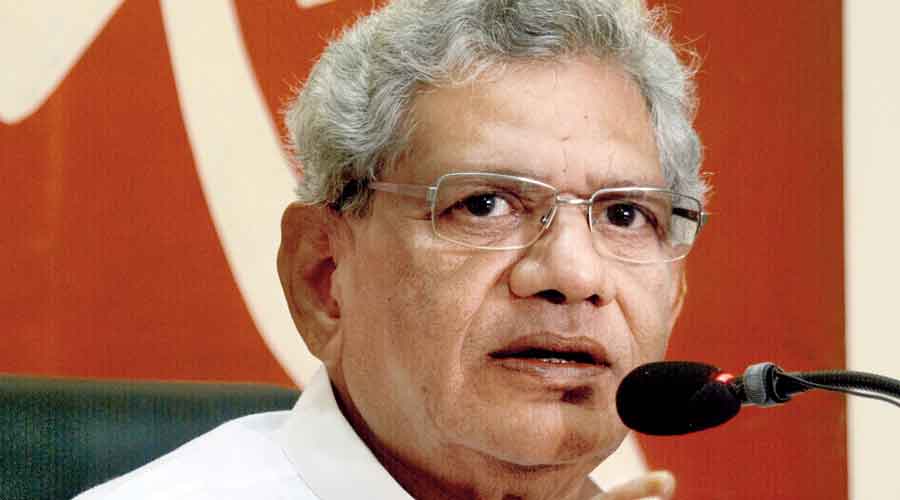The CPM and its labour arm Citu have objected to Gujarat chief electoral officer P. Bharathi’s reported agreements with employers allowing them to monitor the “electoral participation of the workforce” and publicly display the names of employees who don’t vote.
On Wednesday, Bharathi’s office tweeted that the agreements were merely an “appeal for increasing registration and voter turnout, and establish(ing) Voter Awareness Forums” in the companies, and had no provisions to name staff who fail to vote.
However, former chief election commissioner (CEC) S.Y. Quraishi wrote in The Indian Express on Thursday that the statements from Bharathi, as well as current CEC Rajiv Kumar, have “set the cat among the pigeons”.
Citing a news report that quotes Bharathi, CPM general secretary Sitaram Yechury had written to the Election Commission (EC) on Wednesday, saying: "We strongly feel that this is nothing short of being outrageous. The EC has claimed that it is an attempt to address voter apathy, but the fact is that the move to name and shame those who do not vote is a coercive step towards compulsory voting…. The current move by the EC of involving corporates in enforcing the right to vote as a fundamental duty is outright unconstitutional."
Last Tuesday, Citu general secretary Tapan Sen had in a statement expressed fear that the agreements would allow employers to pressure employees to vote for the "ruling dispensation”.
Section 171A(b) of the Indian Penal Code defines “electoral right” as “the right of a person to stand, or not to stand as, or to withdraw from being, a candidate or to vote or refrain from voting at any election”.
This is reiterated in Section 79(d) of the Representation of the People Act, 1951. The Supreme Court held in 2009 and 2013 that abstention from voting was protected under Article 19 of the constitution, which guarantees the freedom of expression.
The Election Commission’s move to enlist employers to increase voter participation came after CEC Kumar’s June 7 trek to two villages in Uttarakhand's Chamoli district where electoral turnouts are above average despite the difficulties of climate and terrain.
Kumar compared this with urban areas, where polling stations are rarely more than 2km away from a voter but where turnouts are often below 50 per cent.
After the three Lok Sabha seats in the Kashmir valley where voter turnouts have been low since the insurgency began in 1989, the next four lowest-turnout seats in the 2019 Lok Sabha elections were Hyderabad and Secunderabad in Telangana, Kalyan in Maharashtra and Patna Sahib in Bihar – all urban constituencies.
“In order to address voting apathy in urban areas, the commission decided to undertake focused awareness activities in this respect, the commission also took note of the fact that under the NegotiableInstruments Act, the polling day is declared as a holiday for all workplaces with the primary purpose of facilitating voting by the employees,” the poll panel said on June 7.
“All central/ state government departments / CPSUs/ state PSUs and corporate entities with 500-plus employees shall appoint a nodal officer to ascertain leave-availing but non-voting employees. SpecialVoter Education and Electoral Participation Awareness sessions would be held for such non-voting members of these organisations.”
Section 135B of the Representation of the People Act mandates paid holidays for all employees — public, private, casual or permanent — on days of polling, except those, "whose absence may cause danger or substantial loss."
This is notified before every election under the negotiable Instruments Act of 1881. However, this is not known to been forced on private employers.
Bharathi’s office has clarified that besides 11 public institutions, MoUs have been signed only with the Gujarat Chamber of Commerce and Industries, Gujarat High Court Advocates Association, Federation of Gujarat State Chemists and Druggists Association, and the Hotels and Restaurants Association (Gujarat). The MoUs have no provisions to name or shame defaulters, it has added.
Citu chief Sen’s statement said about the poll panel’s agreements with employees: “This is a clear reflection of the Election Commission’soverreach going much beyond their mandate, as has already been seen from (the) commission’s move of interfering with the rights of the political parties in the matter of poll promises.
“Further, it gives the employers’ class another handle not only to coerce and harass the working people; but it may also open the avenue to provoke unduly (sic) pressure, manipulation or influence on the voters by the employers, obviously in favour of (the) ruling dispensation.”
Gujarat had in 2011 passed a law making voting mandatory in local body polls but Gujarat High Court stayed this in 2015. The same year, the law Commission issued a recommendation against making voting compulsory, saying this was “impractical”.
In March this year, Union law minister Kiren Rijiju told the Lok Sabha that there was no proposal for compulsory voting.
Opposition parties and several former CECs had recently opposed a proposal by the poll panel for parties to explain the financial viability of the poll promises they make in their manifestos.











